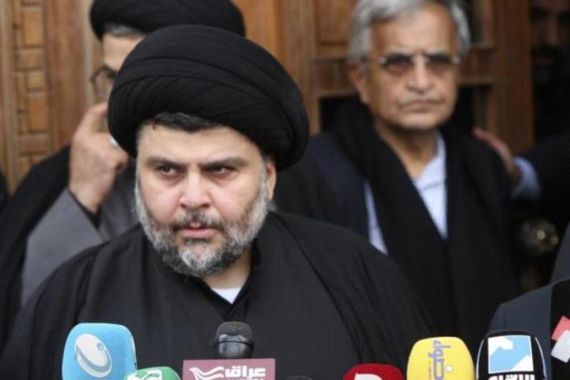Iraqi cleric Sadr retires from politics
Shia leader Muqtada al-Sadr says he will withdraw from politics and close his offices in a letter posted on his website.

Iraqi religious and political leader Muqtada al-Sadr has announced a complete withdrawal from Iraqi politics.
In a letter posted on his website on Sunday, the Shia leader stated he would not hold any political office and that no bloc would represent him in the Iraqi parliament. The letter also stated that Sadr would be closing all his offices.
Despite not holding any official position in the Iraqi government, Sadr holds significant influence in Iraqi politics. He was the creator of the Mehdi Army, a paramilitary group that was involved in the Iraq War and clashed with US forces on many occasions.
The Mehdi Army was disbanded under government pressure in 2008, following a clash with Iraqi Army forces controlled by Prime Minister Nouri al-Maliki.
Sadr is also a head of a political party named after him, which forms part of the National Iraqi Alliance coalition in the Iraqi parliament.
US opponent
Sadr has been a very vocal critic of the continued US presence in Iraq after the toppling of Saddam Hussein.
In 2004, a US-backed arrest warrant was issued for Sadr over the murder of a rival religious leader.
Followers of Sadr stood for parliament as part of the United Iraqi Alliance bloc of Shia political groups in December 2005.
But in November 2006, Sadr declared a boycott of the Iraqi government in protest over a summit held by al-Maliki and President George Bush in Jordan.
The boycott lasted for two months, with the Sadrists eventually returning to their positions. In anticipation of “the surge” crackdown by US troops, he fled the country to Iran in 2007, returning to Iraq four years later.
It is a common belief that Sadr wishes to create a theocracy in Iraq, although Sadr himself has on occasion stated that he wishes to create an “Islamic democracy”.
Sadr mixes Iraqi nationalism and Shia religiosity, making him a figurehead for many of Iraq’s Shia Muslims.